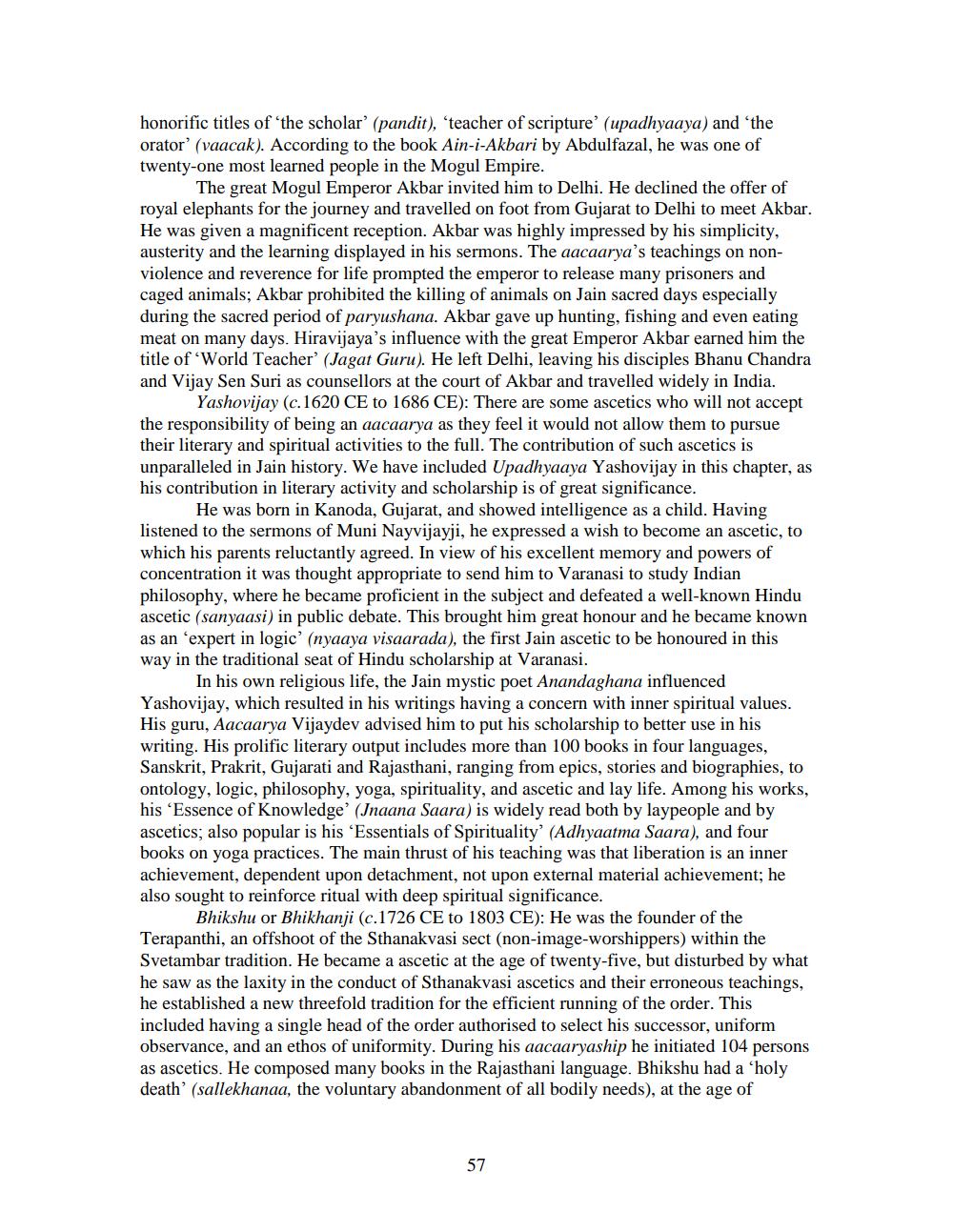________________
honorific titles of the scholar' (pandit), 'teacher of scripture' (upadhyaaya) and the orator' (vaacak). According to the book Ain-i-Akbari by Abdulfazal, he was one of twenty-one most learned people in the Mogul Empire.
The great Mogul Emperor Akbar invited him to Delhi. He declined the offer of royal elephants for the journey and travelled on foot from Gujarat to Delhi to meet Akbar. He was given a magnificent reception. Akbar was highly impressed by his simplicity, austerity and the learning displayed in his sermons. The aacaarya's teachings on nonviolence and reverence for life prompted the emperor to release many prisoners and caged animals; Akbar prohibited the killing of animals on Jain sacred days especially during the sacred period of paryushana. Akbar gave up hunting, fishing and even eating meat on many days. Hiravijaya's influence with the great Emperor Akbar earned him the title of 'World Teacher (Jagat Guru). He left Delhi, leaving his disciples Bhanu Chandra and Vijay Sen Suri as counsellors at the court of Akbar and travelled widely in India.
Yashovijay (c. 1620 CE to 1686 CE): There are some ascetics who will not accept the responsibility of being an aacaarya as they feel it would not allow them to pursue their literary and spiritual activities to the full. The contribution of such ascetics is unparalleled in Jain history. We have included Upadhyaaya Yashovijay in this chapter, as his contribution in literary activity and scholarship is of great significance.
He was born in Kanoda, Gujarat, and showed intelligence as a child. Having listened to the sermons of Muni Nayvijayji, he expressed a wish to become an ascetic, to which his parents reluctantly agreed. In view of his excellent memory and powers of concentration it was thought appropriate to send him to Varanasi to study Indian philosophy, where he became proficient in the subject and defeated a well-known Hindu ascetic (sanyaasi) in public debate. This brought him great honour and he became known as an expert in logic' (nyaaya visaarada), the first Jain ascetic to be honoured in this way in the traditional seat of Hindu scholarship at Varanasi.
In his own religious life, the Jain mystic poet Anandaghana influenced Yashovijay, which resulted in his writings having a concern with inner spiritual values. His guru, Aacaarya Vijaydev advised him to put his scholarship to better use in his writing. His prolific literary output includes more than 100 books in four languages, Sanskrit, Prakrit, Gujarati and Rajasthani, ranging from epics, stories and biographies, to ontology, logic, philosophy, yoga, spirituality, and ascetic and lay life. Among his works, his Essence of Knowledge' (Jnaana Saara) is widely read both by laypeople and by ascetics, also popular is his 'Essentials of Spirituality' (Adhyaatma Saara), and four books on yoga practices. The main thrust of his teaching was that liberation is an inner achievement, dependent upon detachment, not upon external material achievement; he also sought to reinforce ritual with deep spiritual significance.
Bhikshu or Bhikhanji (c.1726 CE to 1803 CE): He was the founder of the Terapanthi, an offshoot of the Sthanakvasi sect (non-image-worshippers) within the Svetambar tradition. He became a ascetic at the age of twenty-five, but disturbed by what he saw as the laxity in the conduct of Sthanakvasi ascetics and their erroneous teachings, he established a new threefold tradition for the efficient running of the order. This included having a single head of the order authorised to select his successor, uniform observance, and an ethos of uniformity. During his aacaaryaship he initiated 104 persons as ascetics. He composed many books in the Rajasthani language. Bhikshu had a 'holy death' (sallekhanaa, the voluntary abandonment of all bodily needs), at the age of




